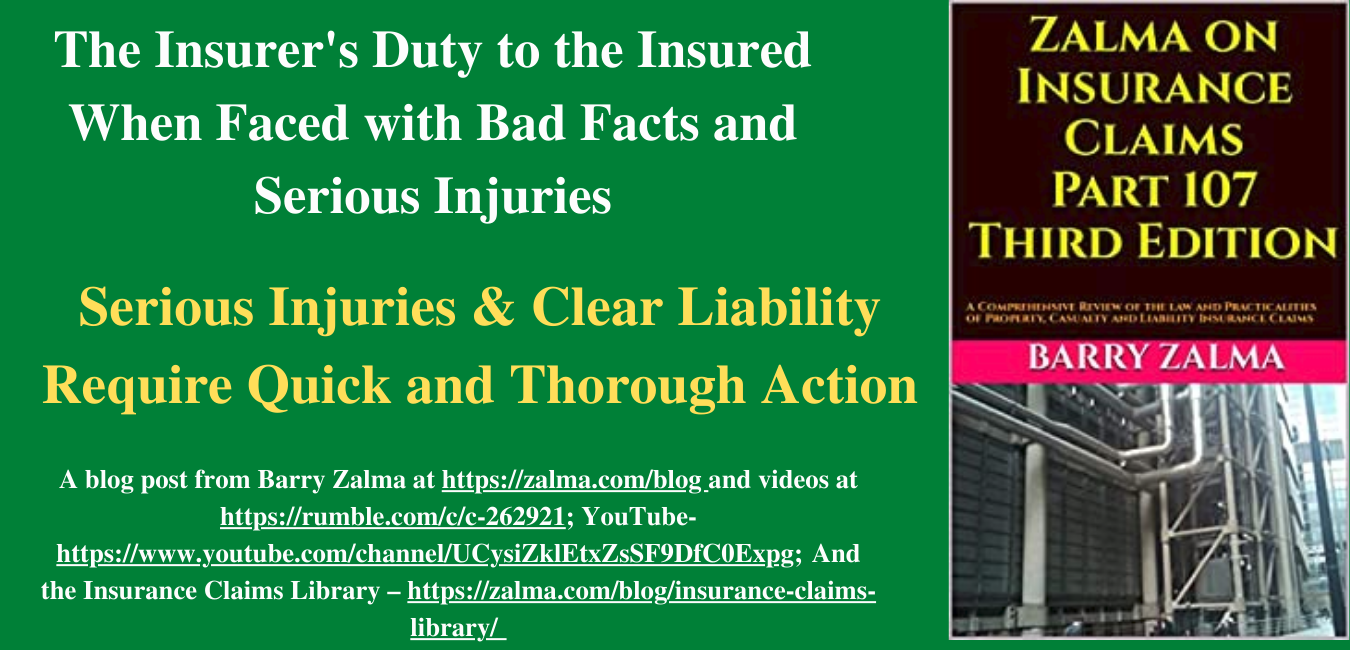-
News Feed
- EXPLORE
-
Pages
-
Groups
-
Events
-
Blogs
-
Marketplace
-
Offers
-
Jobs
-
Developers
The Insurers Duty to the Insured with Clear Liability and Serious Injuries

A Video Explaining Why Serious Injuries & Clear Liability Require Quick and Thorough Action
Read the full article at https://www.linkedin.com/pulse/insurers-duty-insured-when-faced-bad-facts-serious-zalma-esq-cfe and see the full video at https://rumble.com/vo5vhm-the-insurers-duty-to-the-insured-when-faced-with-bad-facts-and-serious-inju.html?mref=6zof&mrefc=2 and at https://youtu.be/mdSCkmAikSw and at https://zalma.com/blog plus more than 3950 posts.
See the full video at https://rumble.com/vo5vhm-the-insurers-duty-to-the-insured-when-faced-with-bad-facts-and-serious-inju.html?mref=6zof&mrefc=2 and at https://youtu.be/mdSCkmAikSw
Some lawsuits are based on clear liability and terrible facts and injuries that compel the parties involved to settle the case as quickly as possible. In such cases defending and indemnifying the insured is liable to be costly and could easily exceed the available policy limits. If the adjuster’s reaction to the fact pattern is disbelief or horror, and his or her first impulse is to trade the claim to another adjuster, these are signs that the case must be settled quickly.
Bad facts and bad injuries get more expensive with time. These cases should not be aggressively defended but should rather be handled with empathy and generosity so that they can be resolved within the limits available from the insured’s policy.
The worst of all cases could be an insured who admits he fell asleep at the wheel, crossed over the double line and an island and struck a tiny Ford Escape head on and rendered a paraplegic a 40 year old widower father of four minor children all of who suffered from Down Syndrome and needed constant care. The insured has a policy with only $500,000 in limits. With the admission of liability and the extent of the injuries every effort must be made to pay the limits as soon as possible. A release on behalf of the insured would be useful but the adjuster should not make the injured file suit before paying the limit, even if it must be paid without condition.
Bad facts usually result in bad law. It is improper to take a chance on the insured facing an uninsured loss just to give the insurer the opportunity to create a legal precedent favorable to the insurer. The fact that more trial court judgments are affirmed than are reversed should temper the desire to file an appeal.
An insurer should never experiment if there is any potential that the insured could incur an uninsured loss unless the insurer is willing to guarantee payment of any judgment regardless of the policy’s liability limits.
Zalma on Insurance Claims Part 107 Third Edition: A Comprehensive Review of the law and Practicalities of Property, Casualty and Liability Insurance Claims at https://www.amazon.com/dp/B09K21C8LG/ref=sr_1_2?dchild=1&keywords=zalma+on+insurance+claims+part+107+third+edition&qid=1635166744&sr=8-2
We are 100% funded for October.
Thanks to everyone who helped out. 🥰
Xephula monthly operating expenses for 2024 - Server: $143/month - Backup Software: $6/month - Object Storage: $6/month - SMTP Service: $10/month - Stripe Processing Fees: ~$10/month - Total: $175/month
- Art
- Causes
- Crafts
- Crime
- Dance
- Drinks
- Film
- Finance
- Fitness
- Food
- Games
- Gardening
- Health
- Home
- Literature
- Music
- Networking
- Paranormal
- Other
- Politics
- History
- News
- Party
- Science
- Religion
- Shopping
- Sports
- SyFy
- Politically Incorrect
- Philosophy
- Theater
- Technology
- Wellness



